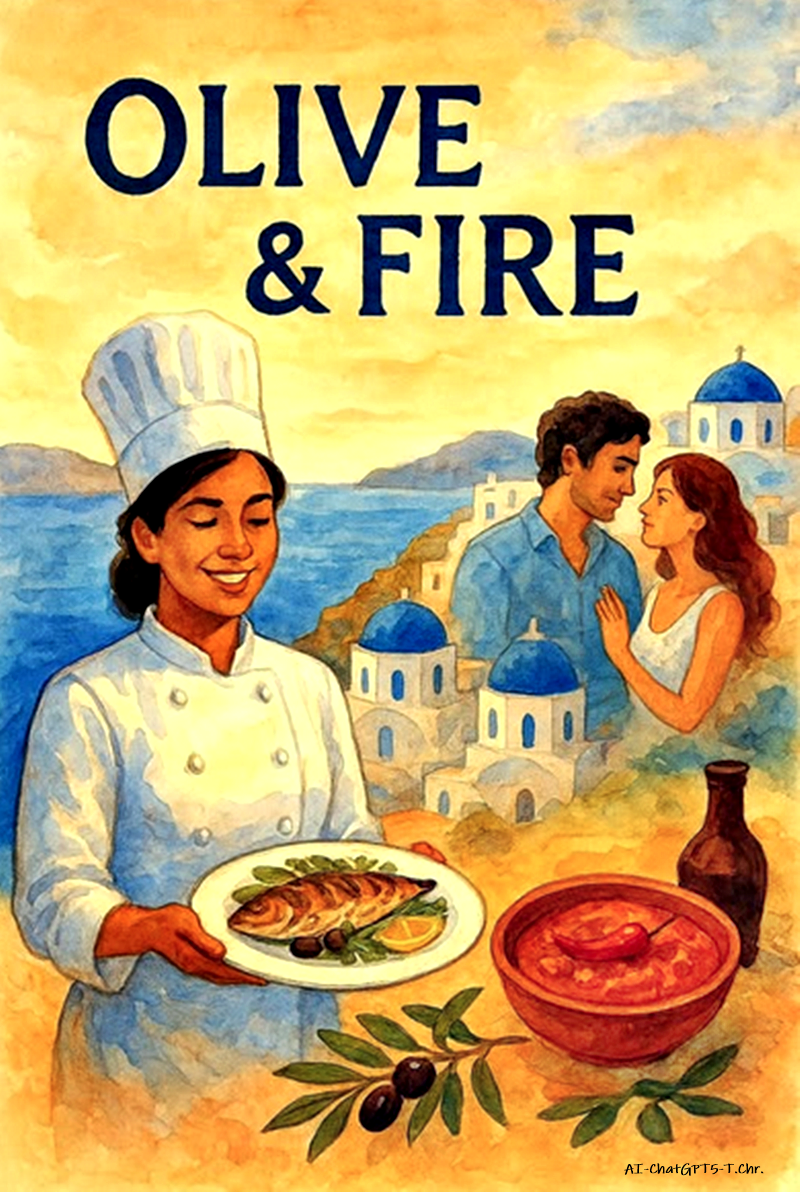" OLIVE & FIRE"

By AI ChatGPT5-T.Chr.-Human Synthesis-31 October 2025
When Isabela Duarte stepped off the plane at Athens International Airport, the air was a mixture of sea salt, sun-baked dust, and roasted coffee. She drew in a deep breath and smiled. After years of long shifts in São Paulo kitchens, this was her moment...
Greece, the cradle of food, myth, and the Mediterranean soul. She had come with little more than her knives, a notebook filled with recipes from her grandmother’s kitchen, and a dream: to become head chef in one of the top restaurants overlooking the Aegean.
Isabela’s Reflections on Greece
When I think back on my years in Greece, it’s not just the recipes I remember — it’s the places, each one with its own rhythm, its own scent, its own lesson.Athens was my first teacher. It’s a city of contradictions — ancient and restless, wise and impatient.
I lived in Pangrati, close to the National Garden, where the streets were lined with orange trees that dropped their fruit in the dust.From there, I could walk to the Plaka, the old quarter, a maze of narrow lanes that always seemed to lead either up toward the Acropolis or down into the hum of cafés.
I’d sit outside small tavernas where the same families had cooked for generations, listening to the sound of bouzouki mixed with the clatter of dishes.Athens taught me that tradition isn’t about doing things the same way — it’s about remembering why you do them.When Nikos and I started traveling, I fell in love with Naxos, his grandmother’s island.
Naxos is the largest of the Cyclades, greener than most — a place where the mountains meet the sea and the air smells of thyme and goat cheese. There are villages there, like Apeiranthos, built entirely of marble, where old women sit in doorways weaving lace and gossiping. Life moves slowly there, and the food is pure — fresh fish, mountain honey, creamy cheese. It was in Naxos that I learned the Greek secret: food is never rushed. It waits for the right moment, the right company, the right silence between bites.
And then, of course, Santorini — the island of fire and water. No place in the world looks like it. Built on the rim of an ancient volcano, the island rises straight out of the sea, all white walls and blue domes that catch the light like mirrors. When we opened Olive & Fire, we found a small plot high above the caldera, where the sunsets melt into the Aegean like a painting. The soil there is volcanic, black and rich, and it gives a strange sweetness to the tomatoes and wine.
Santorini taught me balance — between fire and salt, between passion and patience.We also visited Delphi, where I felt the echo of the old gods in the mountains, and Crete, where every meal comes with a story — about shepherds, pirates, or love. In Chania, I tasted olive oil so green it looked alive, pressed from trees older than history.Each place left a flavor in my memory — Athens like bitter coffee, Naxos like honey and sun, Santorini like sea and smoke.
Together, they became the map of my life — a recipe written not in words, but in landscapes.Even now, when I cook, I can hear them all — the waves, the cicadas, the church bells at dusk. Greece didn’t just change my cooking. It changed the way I see the world — as a table that always has room for one more plate, one more story, one more flame.
Arrival
Her first days were chaotic and beautiful. She rented a small, whitewashed flat in Pangrati, near the National Garden. The apartment was tiny — one window, a squeaky fan, and a view of terracotta rooftops — but to Isabela it felt like a palace. Each morning, she walked to the local market, greeting the old fishmonger who called her “moro mou” (my baby) after she bought fresh sardines and laughed at his jokes.
The colours of the market amazed her — tomatoes bursting with sweetness, emerald-green olive oil, and cheeses that tasted of the sea. She wrote down everything she tasted, combining it in her mind with the tropical flavours she knew so well — lime, coconut, cassava, passion fruit.
The Struggle
Finding work wasn’t easy. She went from restaurant to restaurant with her printed résumé — Chef from São Paulo, experience in seafood and contemporary fusion cuisine — but most managers smiled politely and said, “We’ll call you.” She cooked for herself in the evenings, testing recipes for an imaginary menu she called “Brazil Meets the Aegean.”
She fried octopus in dendê oil, mixed feta with roasted manioc, and created a dish of grilled sardines with mango and oregano that she hoped might win someone’s attention one day.Then one afternoon, while she was sitting in a small café near the Plaka, she met Nikos.
Love Arrives Like a Lemon Breeze
Nikos was sketching at a table nearby — the Acropolis, half-finished, sunlight caught in his hair. He noticed her flipping through a Greek cookbook with a Portuguese dictionary beside it. “You’re studying Greek?” he asked. She smiled. “Trying. I need to know how to order coriander and not a couch.”They talked for hours, discovering a shared love of simplicity — olive oil, salt, and truth.
Nikos was a local architect who spent weekends restoring old fishing houses on the islands. Within weeks, they were inseparable. He took her to his grandmother’s village in Naxos, where she cooked for the family — moqueca de camarão with a Greek twist of saffron and lemon. His grandmother kissed her hands in approval.
The Breakthrough
Back in Athens, Isabela’s luck changed. One of Nikos’s friends mentioned that “Thalassa,” a new fine-dining restaurant in Santorini, was looking for a creative sous-chef. Isabela sent her menu — “Brazilian heart, Greek soul.” Two weeks later, she was on a ferry to Santorini, the sky melting into pink and gold. At the interview, the head chef tasted her shrimp in coconut milk and murmured, “You’ve brought the sun to the sea.” She was hired on the spot.Becoming the Chef
Months passed.
Tourists lined up for her dishes — grilled seabass with cashew-lime cream, lamb with passion fruit glaze, Greek coffee ice cream with cachaça syrup. Reviews called her “a tropical storm in the Cyclades.”Nikos visited often, sketching her as she worked — a streak of color against the white of the kitchen, her hair tied up, eyes burning with focus. On a night heavy with stars, he asked her to marry him on the edge of the caldera. She said yes, whispering, “You’re my best recipe.”
Epilogue
Years later, their restaurant, Olive & Fire, stood on a hill in Santorini — half Greek taverna, half Brazilian bistro — with blue shutters, clay pots, and a garden of basil and mint. Guests came from everywhere, drawn by flavours that danced between continents.And in every dish, from her fiery moqueca to her delicate Greek pastries with tropical fruits, lived the taste of her journey — of courage, love, and the blending of two bright worlds.
“The Last Harvest”
The years rolled by like gentle waves against the caldera. The crowds still came to Olive & Fire, though now the evenings were quieter — fewer journalists, more familiar faces. Isabela Duarte had turned sixty-three. Her hands bore the fine scars of a life spent near heat and knives, but her eyes were as bright as ever, alive with the glow of flame and purpose.
Nikos’s hair had turned silver, but he still sketched her as he always had — bent over a pot, tasting, adjusting, smiling in concentration. The walls of the restaurant were filled with his drawings: portraits of fishermen, lovers, and one of Isabela laughing with her hair in disarray, holding a spoon like a paintbrush.
A New Generation
One autumn, a young woman from Brazil arrived at Olive & Fire, carrying a letter of recommendation and eyes full of the same restless fire Isabela once had.Her name was Luana Ribeiro, twenty-four, raised in Bahia, and a graduate of Isabela’s academy.“ I don’t want to cook what people expect,” she said during her trial meal. “I want to make them remember something they didn’t know they missed.”Isabela looked at Nikos, smiling. “That was exactly what I said thirty years ago.”
Luana stayed — first as an apprentice, then as a sous-chef. She worked fiercely, sometimes impatiently, but with great heart. Isabela saw herself in her — the same hunger, the same stubborn belief that food could tell stories deeper than words.
The Whisper of Time
One summer evening, as the island glowed gold under the setting sun, Isabela felt a sharp pain in her chest while stirring a pot of saffron rice.It passed quickly, but she knew what it meant. Her health had been faltering, and she could no longer ignore it. That night, she and Nikos sat outside the restaurant, watching lights flicker on the opposite cliffs. “Nikos,” she said softly, “one day soon, this place will belong to someone else.” He took her hand, tracing the calluses of her palm.“It will always be ours,” he said. “Even when we’re gone, the sea will remember.”
The Decision
The following spring, Isabela gathered her staff and announced her retirement.There were tears, laughter, and silence — until she called Luana forward and placed in her hands the heavy brass key to Olive & Fire. “You’ll change it,” Isabela said. “You must. Every chef must build her own world. But promise me one thing — keep the soul of it: courage and love.” Luana nodded, unable to speak.
The Final Feast
A week later, the island’s residents, local fishermen, artists, and friends filled the terrace for one final dinner cooked by Isabela and Nikos together. No menus, no reservations — just the sea breeze, the scent of thyme, and laughter echoing into the night.The meal ended with a simple dessert: roasted figs with honey and a touch of cachaça.When the guests applauded, Isabela stood, raised her glass, and said: “All recipes end the same way — with a memory. But if we’ve done our work right, the taste never fades.”
Epilogue — The Olive Tree
Years later, travelers to Santorini still find Olive & Fire open — but now the sign says Luana Ribeiro, Chef de Cuisine. She’s added her own Bahian flair, but one thing remains unchanged: in the courtyard grows a single olive tree that Isabela and Nikos planted together on their first anniversary.
Locals say that on quiet nights, when the wind blows from the south, the leaves rustle like laughter — and if you stand close enough, you can smell a mix of sea salt and mango in the air.
Because some loves — and some flavors — never truly fade.
